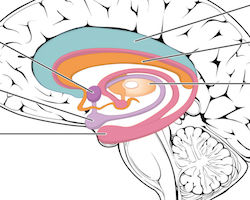Smell and Memory

It’s the middle of winter, but you are going to be out in the sun all day, so you pull out your bottle of sunscreen and pour some into your palm. Suddenly, the tropical sunscreen smell makes you think of summer, and digging your toes into warm beach sand. Why do some smells link to specific memories?
The olfactory bulb that recognizes smells is part of the limbic system, which is the part of the brain that deals with emotion, memory, and feelings. When you smell things, the olfactory bulb talks to the rest of the system, allowing your brain to make a connection between the smell and what you’re feeling or experiencing at the time. That’s why childhood experiences are often brought back up when you smell something you encountered at an early age, and why people often like different sets of smells.

The limbic system isn’t the only one that talks to the olfactory system. In fact, flavor is a combination of your sense of smell and your sense of taste. Your brain combines the sensations to give a more unique recognition of the food you are tasting. Some animals, like mice, have brains that will combine sounds and smells to allow them to better sense the world around them.
Additional images via Wikimedia Commons.
Read more about: How Do We Sense Smell?
Bibliographic details:
- Article: Smell and Memory
- Author(s): Dr. Biology
- Publisher: Arizona State University School of Life Sciences Ask A Biologist
- Site name: ASU - Ask A Biologist
- Date published: 15 Sep, 2017
- Date accessed:
- Link: https://askabiologist.asu.edu/smell-and-memory
APA Style
Dr. Biology. (Fri, 09/15/2017 - 09:42). Smell and Memory. ASU - Ask A Biologist. Retrieved from https://askabiologist.asu.edu/smell-and-memory
Chicago Manual of Style
Dr. Biology. "Smell and Memory". ASU - Ask A Biologist. 15 Sep 2017. https://askabiologist.asu.edu/smell-and-memory
Dr. Biology. "Smell and Memory". ASU - Ask A Biologist. 15 Sep 2017. ASU - Ask A Biologist, Web. https://askabiologist.asu.edu/smell-and-memory
MLA 2017 Style

Our brain links certain smells to things we've seen, tasted, or experienced.
Be Part of
Ask A Biologist
By volunteering, or simply sending us feedback on the site. Scientists, teachers, writers, illustrators, and translators are all important to the program. If you are interested in helping with the website we have a Volunteers page to get the process started.

